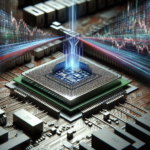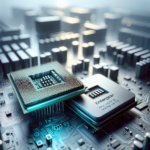The Impact of CPU on High-Frequency Trading Systems

The Impact of CPU on High-Frequency Trading Systems
High-Frequency Trading (HFT) has revolutionized the financial markets by enabling traders to execute orders at unprecedented speeds. At the heart of these systems lies the Central Processing Unit (CPU), a critical component that significantly influences the performance and efficiency of HFT operations. This article delves into the impact of CPUs on high-frequency trading systems, exploring their role, performance factors, and future trends.
Understanding High-Frequency Trading
What is High-Frequency Trading?
High-Frequency Trading is a type of algorithmic trading characterized by the rapid execution of a large number of orders within fractions of a second. HFT firms leverage sophisticated algorithms and advanced technology to capitalize on minute price discrepancies in the market. The primary goal is to achieve small but consistent profits that accumulate over time.
The Role of Technology in HFT
Technology is the backbone of HFT. The speed and efficiency of trading systems are paramount, as even microsecond delays can result in significant financial losses. Key technological components include:
- Algorithms: Complex mathematical models that analyze market data and make trading decisions.
- Network Infrastructure: High-speed connections to trading venues to minimize latency.
- Hardware: Powerful CPUs and other hardware components that process data and execute trades.
The Role of CPUs in High-Frequency Trading
Why CPUs Matter
CPUs are the central processing units of computers, responsible for executing instructions from programs. In HFT systems, CPUs play a crucial role in:
- Data Processing: Analyzing vast amounts of market data in real-time.
- Algorithm Execution: Running complex trading algorithms efficiently.
- Order Execution: Sending orders to exchanges with minimal latency.
Performance Factors
The performance of CPUs in HFT systems is influenced by several factors:
- Clock Speed: Higher clock speeds enable faster data processing and algorithm execution.
- Core Count: Multi-core CPUs can handle multiple tasks simultaneously, improving overall efficiency.
- Cache Size: Larger cache sizes reduce the time needed to access frequently used data.
- Instruction Set Architecture (ISA): Advanced ISAs can optimize the execution of specific tasks.
Optimizing CPU Performance for HFT
Choosing the Right CPU
Selecting the right CPU for HFT systems involves balancing several factors:
- Performance vs. Cost: High-performance CPUs come at a premium, so firms must weigh the benefits against the costs.
- Compatibility: Ensuring the CPU is compatible with other system components and software.
- Scalability: Choosing CPUs that can scale with increasing trading volumes and complexity.
Overclocking
Overclocking involves increasing the clock speed of a CPU beyond its factory settings to boost performance. While this can enhance HFT system speed, it also comes with risks:
- Heat Generation: Overclocked CPUs generate more heat, requiring advanced cooling solutions.
- Stability: Overclocking can lead to system instability and potential crashes.
- Longevity: Increased wear and tear can reduce the lifespan of the CPU.
Parallel Processing
Parallel processing involves using multiple CPU cores to execute tasks simultaneously. This approach can significantly enhance HFT performance by:
- Reducing Latency: Parallel processing minimizes delays in data analysis and order execution.
- Improving Throughput: Handling more transactions per second.
- Enhancing Reliability: Distributing tasks across multiple cores reduces the risk of system failures.
Future Trends in CPU Technology for HFT
Advancements in CPU Architecture
Future CPUs are expected to feature advanced architectures that further optimize performance for HFT systems. Key trends include:
- Increased Core Counts: More cores will enable greater parallel processing capabilities.
- Enhanced ISAs: New instruction sets will improve the efficiency of specific tasks.
- Integrated AI Capabilities: AI-enhanced CPUs will enable more sophisticated algorithm execution.
Quantum Computing
Quantum computing holds the potential to revolutionize HFT by solving complex problems at unprecedented speeds. While still in its infancy, quantum computing could eventually enable:
- Ultra-Fast Data Processing: Analyzing vast amounts of market data in real-time.
- Advanced Algorithm Execution: Running highly complex algorithms that are currently infeasible.
- Reduced Latency: Minimizing delays in order execution.
Challenges and Considerations
Regulatory Concerns
The rapid pace of HFT has raised regulatory concerns, including market manipulation and systemic risk. Regulators are increasingly scrutinizing HFT practices to ensure market integrity and stability. Firms must stay abreast of regulatory developments and ensure compliance to avoid penalties and reputational damage.
Ethical Considerations
The use of advanced technology in HFT raises ethical questions about market fairness and the potential for exploitation. Firms must consider the broader impact of their trading practices and strive to maintain ethical standards in their operations.
FAQ
What is the primary role of CPUs in high-frequency trading systems?
CPUs are responsible for executing instructions from programs, which in HFT systems includes processing market data, running trading algorithms, and executing orders with minimal latency.
How does clock speed affect CPU performance in HFT systems?
Higher clock speeds enable CPUs to process data and execute algorithms faster, which is crucial for minimizing latency and maximizing trading efficiency in HFT systems.
What are the risks associated with overclocking CPUs in HFT systems?
Overclocking can enhance CPU performance but also generates more heat, potentially leading to system instability and reduced CPU lifespan. Advanced cooling solutions and careful management are required to mitigate these risks.
How can parallel processing improve HFT performance?
Parallel processing uses multiple CPU cores to execute tasks simultaneously, reducing latency, improving throughput, and enhancing system reliability by distributing tasks across multiple cores.
What future trends in CPU technology could impact HFT systems?
Future trends include increased core counts, enhanced instruction set architectures, integrated AI capabilities, and the potential for quantum computing, all of which could significantly boost HFT performance.
Conclusion
The impact of CPUs on high-frequency trading systems cannot be overstated. As the central component responsible for data processing, algorithm execution, and order placement, the performance of CPUs directly influences the efficiency and profitability of HFT operations. By understanding the key factors that affect CPU performance and staying abreast of technological advancements, HFT firms can optimize their systems to maintain a competitive edge in the fast-paced world of financial trading.




